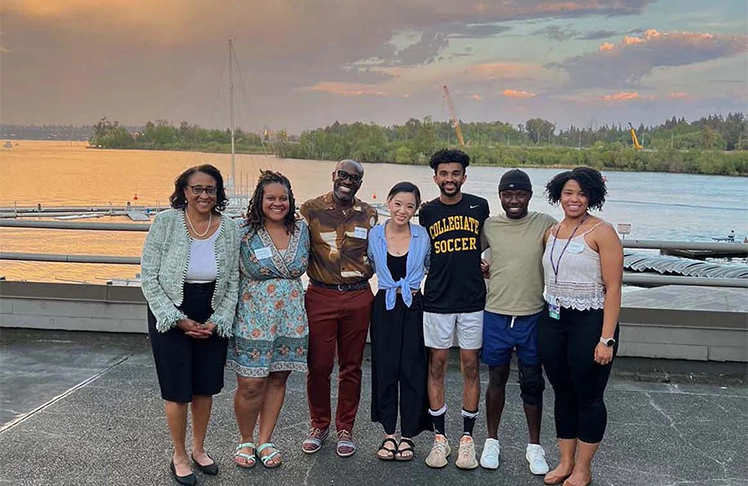
By Kiara Doyal, The Seattle Medium
The University of Washington School of Medicine (UWSOM) offers unique opportunities for medical students to pursue specialized interests and develop advanced knowledge. One prominent example is the Black Health Justice Pathway, a program focused on addressing systemic oppression and health disparities affecting Black communities. This pathway aims to equip future physicians with the tools to advocate for health equity both during their education and in their professional practices.
The Black Health Justice Pathway provides students with foundational knowledge to assess health inequities through a critical lens. It is designed to help students advocate for health equity within the UWSOM, in Black communities, and in their future careers.
According to Holly Kennison, Healthcare Equity Pathway Program Manager at the UWSOM, pathway programs are becoming more popular around the nation within medical schools, but remain relatively rare, and the UWSOM highlights this as a significant benefit of its medical program.
Launched in 2019 by five UW medical students, the Black Health Justice Pathway targets those interested in working with urban and underserved communities. Students enrolled in this pathway participate in a rigorous course that examines African American health disparities, covering issues and goals from the past, present, and future.
“The class of 2019 had the largest Black student population that UWSOM has ever had, and they recognized a need for revamping the topics of African American health disparities and providing a pathway for students focusing on urban and underserved communities,” Kennison explained.
Jeremiah Sims, a UWOS Ph.D. student and co-founder of the Black Health Justice Pathway, said the pathway’s creation was driven largely by the significant number of Black students enrolled in 2019.
“As a Black trainee, the only logical option was to rally with my other Black trainees to bring this course into fruition,” Sims said. “We had the critical mass and the mission, and we understood that we had the tools and people in that moment to make this pathway happen.”
Scholarly projects, a detailed study of a topic that can involve research, analysis, and interpretation of data, are one of many requirements for medical school. However, Kennison shared that the big difference between regular medical students and students participating in the Black Health Justice Pathway, is that their scholarly project must be designated to a topic surrounding Black health.
“They are required to do research throughout the first three and a half years of medical school, so for their scholarly project, these students are choosing topics that have to do with either historical or current trends in Black healthcare disparities.”
The pathway’s curriculum includes courses such as “Undoing Racism in Public Health” and “Structural Racism and Public Health,” which explore the history of systemic racism and its impact on Black communities. Sims recounted the collaborative effort to establish the pathway, noting that the team worked closely with Black faculty outside of UW Medicine to build a compelling case for its necessity.
“Once we had that foundation, we worked with Pathway administrators within the School of Medicine to ultimately nestle our work into their curriculum frameworks,” Sims said.
The pathway’s development was not without challenges. Sims says that previous attempts to create a pathway focusing on Black health at UW Medicine had been unsuccessful.
“Working as a student in this pathway has been an experience of perseverance through frustration,” Sims said. “A pathway focusing on Black folks had been proposed at many points throughout UW Medicine’s history; however, the administration felt that there wasn’t a need at that time.”
Despite these previous setbacks, the founders of the Black Health Justice Pathway were motivated by their belief in the importance of the curriculum.
“We were galvanized by our belief that this curriculum was desperately needed, and together, we managed to pull together all of the pieces over the four years that we were together at UW,” Sims added.
The Black Health Justice Pathway also aims to teach students how to provide effective and compassionate medical care to Black patients, foster collaboration between community organizations and the UWSOM, and address disparities to improve the health of Black communities locally.
“Upon graduation, students will be able to signify that they were a part of this pathway, and it can truly be helpful for those who want to work in underserved communities like inner-city Chicago, Washington D.C., and Downtown Los Angeles,” said Kennison.
Sims agrees and says that he believes that the pathway sets students up for success in their medical careers.
“While each of us Black physicians have different paths in medicine, our experiences in building this human-centric curriculum that combines research and practice is one of our most salient examples of practicing what we preach,” he said.
While applying for residency applications can be a stressful and relatively competitive task, UWSOM medical students can include the Black Health Justice Pathway on their resume and can significantly enhance their portfolio.
“Residency applications are very competitive, and they kind of determine where medical students are going to end up practicing medicine for perhaps the rest of their lives,” says Kennison. “So, this pathway really does matter when it comes to applying for residency and being able to include that in their cover letters, resumes, and most importantly their residency application.”
Reflecting on the pathway’s creation, Sims is grateful for the Pathway that he helped create, and his colleagues for recognizing the need for this curriculum.
“This pathway is the culmination of years of important work,” says Sims. “Through our efforts, we were able to create this course to demonstrate to the UWSOM what we already knew was right; that medical training must include learning about how medicine’s past and present continue to impact Black lives, and justice in medicine requires training that situates medicine within our nation’s history.”


